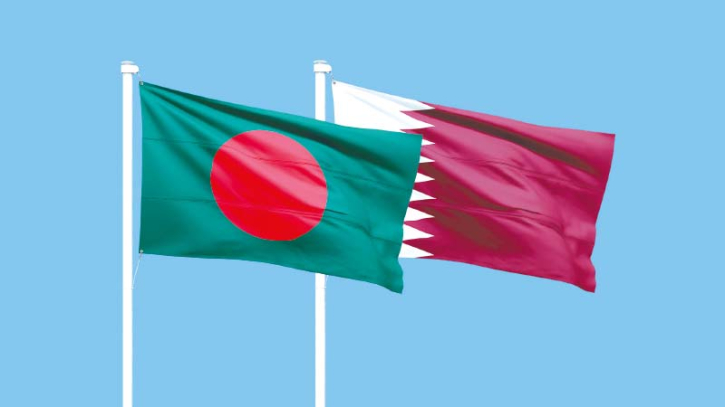Bangladesh and Qatar relations: a promising alliance

Recently, the Honorable Prime Minister of Bangladesh, Sheikh Hasina has visited the Emir of Qatar, Sheikh Tamim bin Hamad Al Thani, during her invitation to attend the United Nations Conference on LDCs in DOHA. During the visit, she has expressed her strong desire to develop Bangladesh's relations with Qatar in various sectors, pointing out that Bangladesh's emerging economy can be a gold mine for Qatari investors.
Bangladesh and Qatar established their diplomatic relations in 1978, very early in Bangladesh's independence period. However, their bilateral economic relations were solidified in 2017 with the signing of a 15-year SPA agreement for LNG between Rasgas (the then second-biggest LNG producer in Qatar) and Petro Bangla (Bangladesh's government-owned national gas company). The agreement stated that Bangladesh will get 1.8 million to 2.5 million tons of LNG per year. This was Bangladesh's first LNG import deal, and it has been critical in sustaining the country's energy needs as it falls behind in domestic gas production. Nevertheless, with the pandemic and the Russia-Ukraine war looming over its economy, it is time for Bangladesh to strengthen its ties with Qatar. Moreover, if bilateral relations can be strengthened via mutual benefit, Qatar, a member of the Gulf Cooperation Council (GCC), might serve as a stepping stone for Bangladesh into the oil-rich Middle Eastern area.
The last ten years have been nothing short of miraculous for Bangladesh's economy. The South Asian nation is predicted to be among the world's fastest-growing economies by 2050 and is already on it’s track to become a trillion dollar economy. On the other side, Qatar being a oil rich nation, is heavily dependent on its oil and natural gas resources, which accounts for 70% of its government revenue. As Qatar wants to reduce its reliance on oil and natural gas, Bangladesh can be a great investment window for the country.
Bangladesh plans to establish 100 special economic zones that may be of interest to Qatari investors, particularly in the IT, amusement, energy, tourism, logistics, infrastructures, and agriculture industries. Other than this, the bilateral trade between Bangladesh and Qatar is already promising where Bangladesh has helped to maintain Qatar’s food security through exports of fruits, vegetables, tea, frozen and processed items in a situation where Qatar imports 90% of its food due to the scarcity of irrigation water needed for food production. Around 400,000 Bangladeshi migrant workers are already working in Qatar so its highly efficient labour market can advance further with more skilled manpower from Bangladesh which has a diversified workforce of 70 million on hire for competitive wages. Many hands of Bangladeshi labourers worked to build the stadiums for Qatar world cup of 2022.
The economic marvels of Bangladesh can be rightly attributed to its highly agile labour force and strong remittance inflow. To expand and strengthen the remittance backbone, more constructive labour relations with Qatar can prove to be beneficial as the country is interested in recruiting nurses, medical professionals and technicians from Bangladesh.
Recently, Bangladesh has been dealing with balance of payment problems due to a deficit in export-import. Here, Qatar can provide support to the country by being an export hub for Bangladesh’s growing pharmaceutical industry which has been producing international standard and cost-effective medicines.
Qatari outlets of Lulu Group International grocery are already on their ways to create a Bangladeshi corner for imported products from Bangladesh which will include food and non-food products. The group also intends to eye Bangladeshi exports such as ready-made garments, handicrafts, vegetables, and others. The mutual reliance between these two countries is also very aspiring. While Bangladesh supports Qatar’s food supply, Qatar helps to strengthen Bangladesh’s agriculture industry. The countries signed an MOU in 2009, under which Bangladesh exports 800,000 metric tons of urea fertilizer every year from Qatar.
Qatar has also been a huge support in the case of sustaining the Rohingya population in the Cox’s Bazar refugee camps. Qatar Charity (QC) has played a significant part in providing medical services and food packages free of charge to more than 16000 of the deprived community. QC's assistance program has helped 123,000 Rohingya refugees on Bhasan Char Island during the last two years. Not only that, the Qatar Red Crescent Society (QRCS) recently dispatched two medical convoys to perform free surgeries for refugees in camps and the local community in Teknaf', in the southern region of Bangladesh.
The benefits of this alliance seem to be understood by both parties as they have signed MOUs in different sectors such as power and energy, education, defense, development fund and human rights field. On one hand, Bangladesh prepares to send 1,129 members of armed forces to Qatar on deputation, on the other, the Emir of Qatar has reassured that Qatar will help Bangladesh in its growing demand for energy which was urged by the PM in her visit. If such strong brotherly relations continue, Qatar Chamber might find a stable ground for investment in agriculture and tourism in South Asia while the vision of smart Bangladesh by 2041 can be realized with the collaboration of Qatar if it manages to establish itself as a business safe nation with its new policies such as reduced income tax with corporate taxes. Also, Bangladesh's Rohingya repatriation effort necessitates massive financial support, which the government is currently seeking and Qatar's assistance might be enormous in this regard. The potential visit of the Emir of Qatar this year might add an opportunity to address the issue between these countries.
Sadia Aktar Korobi is a master’s student of Peace and Conflict Studies at the University of Dhaka, Bangladesh. The views and opinions expressed in this article are those of the author.
.png)




